[Report] Joint Workshop "Mind, Consciousness and Body"
Center for Subjectivity Research (CFS), University of Copenhagen and UTCP hold a joint workshop “Mind, Consciousness, and Body” at the University of Copenhagen.
The workshop is organized by Katsunori Miyahara, who is a visiting scholar at CFS and a collaborative research fellow at UTCP, and Rasmus Thybo Jensen at CFS.
We had 6 contributors in the workshop. The first speaker, Joel Krueger (CFS), gave a talk titled “Interactive Origins of the Socially Extended Mind”. He argued that a nurturer herself sometimes becomes a part of extended mind of a child referring to work by Lev Vygotsky. His examples are from developmental evidence of attention and emotion.
The second speaker, Mineki Oguchi (Tamagawa University/UTCP) gave a talk titled “Two visual systems theory and the sensorimotor approach”. He argued against Actionist theory of perceptual experience endorsed by Noё and O’Regan in favor of two visual systems theory proposed by Milner and Goodale.
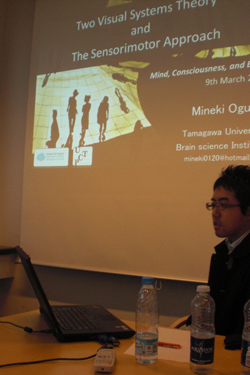
The third speaker was Adrian Alsmith (CFS). The title of his talk was “A puzzle concerning spatial consciousness”. He talked about a tension between following three statements.
(i) A subject’s perceptual experience is unified both within and between its senses according to a single perspective.
(ii) The perspectival nature of perceptual experience ought to be conceived as the point of origin for an egocentric frame of reference.
(iii) Multiple distinct egocentric frames of reference are employed both within and between the senses.
He took this tension seriously and considered the possible solutions for the three theses.
I, Ryoji Sato (UTCP), was the fourth speaker in the workshop. I have given a talk: “How (not) to Find Consciousness in Vegetative State Patient”. I had two purposes there: one positive and one negative. My positive purpose was to show under an appropriate criterion of consciousness ascription, current neuroimaging evidence actually supports the conclusion that the patient is actually consciousness. On the other hand, I also claimed that despite the attempts, there is inherent limitation to find consciousness in vegetative state patients and there might be no fact of the matter if a vegetative patient has consciousness.
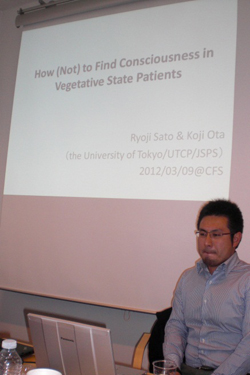
The fifth speaker was originally Prof. Josef Parnas, but he cancelled his talk for an inevitable reason. Katsunori Miyahara replaced his position and gave a talk: “Interactive Skills for Social Understanding”. He supported the perceptual theory of social cognition that especially focuses on embodiment, and argued the theory can play an important role in explanation of varieties of social cognition even though it is often not well recognized.
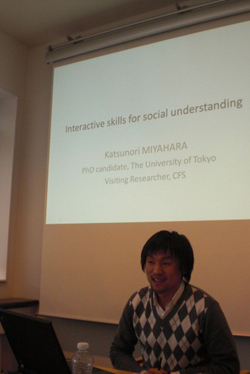
The last speaker was Prof. Kohji Ishihara (UTCP). His talk was “Robotics for developmental Studies: philosophical and ethical considerations”. He introduced recent synthetic approaches of developmental studies that exploit robotics. Acknowledging positive aspects of those researches, he also pointed out philosophical/ethical problems about them. For example, he argued that this kind of approach might miss out the possibility of mechanism that cannot be implemented by current engineering technologies.
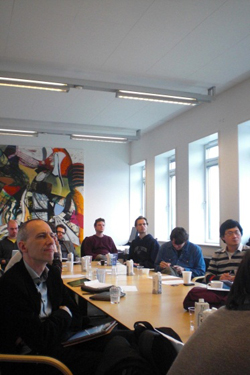
Every talk was followed by vibrant and fruitful discussion. It turned out that we are sharing many topics and interests. We are expecting further interaction/collaborations between CFS and UTCP.
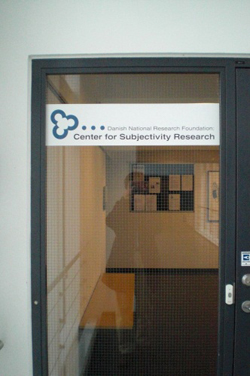
Report: Ryoji Sato (UTCP)






